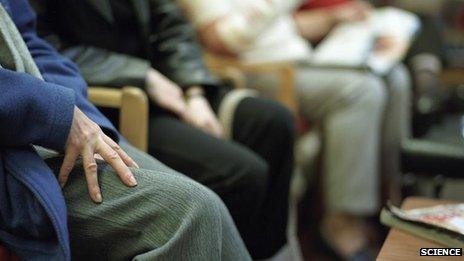Governments in a spin over NHS hospital waiting times
- Published

The Welsh government hit out at David Cameron's interpretation of waiting times
Few things arouse as much hostility or spread as much confusion in politics as a row about statistics.
On Wednesday the prime minister attacked what he said were long waiting times at Welsh hospitals.
He criticised Labour's handling of the Welsh NHS, unfavourably comparing waiting lists to England.
The Welsh government accused David Cameron of getting his figures wrong and offered its own more positive numbers.
Downing Street told us the prime minister's figures came from the Welsh government's own statistics website, external.
So who is right? The answer: everyone and no-one.
'Rattled'
Mr Cameron quoted statistics on the number of people treated in November last year. A third had been on a waiting list for more than 18 weeks before they were treated, he said.
But the Welsh government says things are better than Mr Cameron suggests, accusing a "rattled" prime minister of trying to deflect attention from the flack he is enduring over reforms to the NHS in England.
The Welsh government cited the number of people waiting more than 18 weeks at the end of November - 22%
So is the Welsh government right when it says the prime minister is wrong? Whatever position you take, there are statistics available to support your argument.
Mr Cameron's figures were accurate, it's just they are not the same figures as the ones used by the Welsh government.
The 18-week wait that Mr Cameron mentioned is an English target, not a Welsh one.
In Wales, the target is to see all patients within 36 weeks of them being referred by their GP and to treat 95% of patients within 26 weeks.
Coincidently, the latest batch of Welsh statistics, external were published the day after Mr Cameron's attack in the House of Commons.
'Stagnating'
They show that 91.4% of people on waiting lists at the end of December had been waiting less than 26 weeks - short of the Welsh government's target and worse than the previous month's rate of 92%.
Performance is "stagnating", say the Welsh Conservatives, who point to the situation in December 2009, the month Carwyn Jones took office as first minister.
At the end of 2009, 99.3% of people had been waiting less than 26 weeks. No-one was waiting more than 36 weeks.
But the total number of people waiting for treatment has also risen since then - up from 224,960 to 383,891 in December 2011.
"The figures are very plain for all to see and clearly show a significant rise in both the number of people waiting and the length of time they have been kept on a list," said Welsh Conservative shadow health minister Darren Millar.
The Welsh Liberal Democrats said it was a "disgrace" that 7,699 people had been waiting more than 36 weeks for treatment by the end of last year.
The Welsh government says the NHS dealt with a 27% increase in GP referrals for orthopaedics between 2006 and 2010, prompting extra funding of £21m this year.
Insisting that the "vast majority" of patients were seen on time, a spokesman for Health Minister Lesley Griffiths said: "The Tories simply don't know when to stop digging this hole they are now in.
"We stand by our record on the NHS in Wales - the statistics, the progress and the advances we are making, speak for themselves."
- Published8 February 2012
- Published8 February 2012
- Published25 November 2011